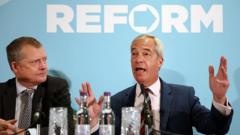Is Reform the Biggest Threat to Scottish Conservatives?

Published: 2025-08-27 23:56:14 | Category: technology
With the upcoming Holyrood election just eight months away, the political landscape in Scotland is shifting dramatically. Reform UK leader Nigel Farage has boldly asserted that the Conservative Party will soon lose its influence in Scotland, particularly following the recent departures of several key members to Reform. This article examines the implications of these changes, the potential rise of Reform UK, and the challenges facing the Scottish Conservatives as they navigate this turbulent political climate.
Last updated: 27 October 2023 (BST)
Key Takeaways
- Reform UK is gaining momentum, consistently leading in recent polls against the Conservatives.
- Several Scottish Tory MSPs have defected to Reform, raising concerns about the party's future.
- The 2024 Holyrood election could see a significant shift in party dynamics, with the potential for Reform to capture seats.
- The Scottish Conservatives face challenges in appealing to both right-wing voters and their moderate base.
- Proportional representation at Holyrood may benefit smaller parties like Reform, complicating the electoral landscape.
The Rise of Reform UK
Reform UK's ascent in Scotland is notable, especially as it now leads the Conservatives in four of the last five opinion polls concerning both constituency and list voting intentions. Farage's party has gained traction, exemplified by their strong third-place finish in the Hamilton by-election in June, where they garnered 26% of the vote compared to the Conservative Party's mere 6%. This trend indicates a growing dissatisfaction among voters with the traditional parties, particularly the Conservatives.
Defections from the Conservative Party
The recent defection of Graham Simpson marks a significant point in Scotland's political narrative. He is the third MSP to leave the Conservative Party in the last four months, following Jamie Greene and Jeremy Balfour. Each departure highlights a growing discontent with the party’s direction under leader Russell Findlay. Such shifts not only weaken the Conservative Party's parliamentary presence but also signal a broader ideological rift within Scottish conservatism.
Challenges for Russell Findlay
As the leader of the Scottish Conservatives, Russell Findlay finds himself at a crossroads. With Reform UK on the rise, he must address the ideological schism within his party. Aligning with Reform's policies on issues like net-zero initiatives and asylum seeker protests could alienate moderate voters who previously supported the party under Ruth Davidson's leadership. This dilemma mirrors the challenges faced by the Labour Party after the independence referendum in 2014, when it struggled to retain support from both ends of the political spectrum.
The Perception of the Conservative Party
Findlay's leadership is increasingly scrutinised, especially as former members express dissatisfaction with the party's direction. Balfour's shift to independent status underscores concerns that the Conservative Party is losing its traditional conservative values, becoming "Trump-esque" in style. This sentiment may resonate with voters who feel detached from the party's current trajectory.
The Electoral Landscape Ahead
The 2024 Holyrood election promises to be fiercely competitive, with seven parties vying for representation. The introduction of Reform UK into this mix complicates the situation further, as they are poised to capture votes in regions where the Conservatives have historically performed well. This zero-sum game means that each seat won by Reform could come at the expense of the Conservatives, significantly altering the balance of power at Holyrood.
Proportional Representation and its Implications
Holyrood's proportional representation system is designed to give smaller parties a fair chance at securing seats. This could work in Reform's favour, especially if the vote is fragmented among several parties. The Green Party, which relies heavily on regional votes, may be particularly vulnerable to a Reform surge. Analysts suggest that if Reform captures even a few regional seats, it could dramatically reshape the Scottish Parliament.
What Lies Ahead for Reform UK and the Conservatives
As the election approaches, both Reform UK and the Conservatives must clarify their positions and policies. Farage's party will need to transition from a vibes-based approach to a more defined manifesto, which may present challenges. Conversely, Findlay must ensure that he balances the party's rightward shift with the need to retain moderate voters.
Potential Outcomes of the Election
Given the current polling trends, the Scottish Conservatives may face an uphill battle to maintain their status in Holyrood. With a wave of MSPs stepping down, the parliament's composition is likely to change, making way for new faces and potentially new policies. The next election not only represents a pivotal moment for the Conservatives but also for the broader political landscape in Scotland, where the electorate is clearly signalling for change.
FAQs
What impact will Reform UK's rise have on the Scottish Conservatives?
Reform UK's rise may significantly undermine the Scottish Conservatives' position, as they are currently polling ahead in multiple areas. This could lead to a loss of seats and further fragmentation of the conservative vote in Scotland.
Why are MSPs defecting from the Conservative Party?
MSPs are defecting due to dissatisfaction with the party's direction under Russell Findlay, particularly regarding its alignment with more extreme right-wing policies that may alienate moderate voters.
How does the electoral system affect smaller parties like Reform UK?
The proportional representation system in Holyrood allows smaller parties like Reform UK to gain seats more easily, especially if the vote is divided among many parties, increasing their chances of electoral success.
What challenges does Russell Findlay face as leader of the Scottish Conservatives?
Findlay must navigate internal divisions, address voter dissatisfaction, and develop a clear platform that appeals to both traditional Conservative supporters and right-wing voters attracted to Reform UK.
What are the implications of a changing Holyrood parliament?
A changing Holyrood parliament could lead to new policies and political dynamics, with Reform UK potentially reshaping the landscape by capturing votes traditionally held by the Conservatives and other parties.
As the landscape evolves, the stakes for both Reform UK and the Scottish Conservatives could not be higher. Voters will have an array of choices, which will ultimately shape Scotland's political future. How will parties adjust to maintain relevance? #ScottishPolitics #ReformUK #HolyroodElection



